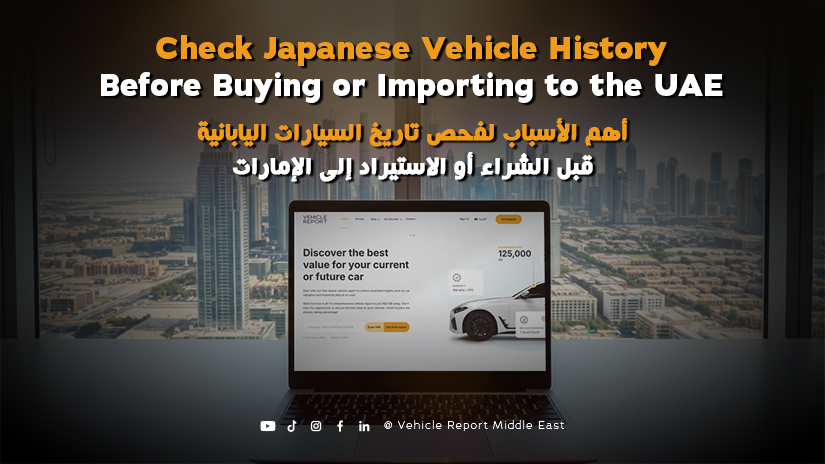Top Reasons to Check the Japanese Vehicle History Before Buying or Importing to the UAE

Japanese vehicles continue to dominate the roads of the United Arab Emirates, accounting for a significant share of the used car market. Some estimates suggest that they make up over 60% of all used car transactions in the country. With a reputation for durability, efficiency, and affordability, it’s no surprise that buyers across the Emirates—from Dubai to Fujairah—are drawn to trusted names like Toyota, Nissan, Honda, and Mitsubishi.
But with so many imported Japanese cars circulating through the market, how can buyers be sure they’re making a safe and worthwhile purchase? The answer lies in the details—and more specifically, in the vehicle’s Japanese history.
In this article, we explore why checking the full background of a Japanese car is essential before buying or importing it to the UAE. From avoiding costly surprises to improving negotiation power, here’s what every buyer should know.
Why Japanese Vehicle History Matters in the UAE Market
Hidden Risks That Could Cost You Later
One of the main advantages of a vehicle history report is the ability to uncover what’s not immediately visible. A car might look perfect on the outside, but under the surface, it could have a problematic past.
For instance, past accidents or structural damage might have been repaired to look good cosmetically, but could still affect safety or lead to mechanical issues later. Reports states that previous accident damage—especially when not properly repaired—is a key factor in reducing vehicle lifespan.
Odometer fraud remains a known concern in the Japanese export market. Although Japan records mileage during vehicle inspections, only the last two records are retained, which, as noted by industry specialists, leaves room for tampering during the export process.
Verifying Authenticity and Legal Compliance
Understanding Ownership and Registration History
When buying a Japanese import, it’s important to know who owned the car before and how it was used. Did it have multiple owners? Was it a personal vehicle or used commercially?
- Number of previous owners
- Any unusual registration gaps or ownership transfers
- Legal export/import documentation
This is essential to avoid purchasing a vehicle that was stolen, shipped illegally, or has pending legal issues. Moreover, if you’re importing the vehicle yourself, verifying that it complies with UAE regulations—like safety, emissions, and modification standards—is critical. Vehicles that don’t meet GCC specs can be difficult to register and may need expensive upgrades.
Maintenance Records = Long-Term Reliability
Predicting the Road Ahead
A clean exterior is nice—but what truly defines reliability is how the vehicle was maintained. Reviewing the car’s maintenance records gives you insight into its past care and future performance.
- Were oil changes done on schedule?
- Did it undergo regular inspections?
- Was any major component, like the gearbox or brakes, ever replaced?
These insights help you plan ahead for future repairs and avoid vehicles with recurring technical problems.
Accurate Pricing and Resale Potential
Assessing Value with Confidence
It’s easy to overpay for a used car, especially when it looks clean and has low mileage. But what if that mileage is fake? What if the car was involved in a major accident and repaired?
A vehicle history report provides market valuation data, based on the car’s actual usage, service records, and condition. This allows you to compare similar vehicles and avoid overpriced listings.
This also matters when it’s time to resell. A car with a documented clean history generally retains more value and is easier to sell. In contrast, cars with vague or questionable histories often raise red flags for buyers.
Safety First: Recalls and Compliance
A Hidden Threat on the Road
Many buyers overlook manufacturer recalls—but they’re more common than you might think. Defective airbags, brakes, or electrical systems can make a vehicle dangerous to drive.
- Any past recalls
- Whether recall fixes have been completed
- If the car meets safety standards in Japan and the UAE
Empowering the Buyer: Negotiation and Confidence
Walk in Informed. Walk Out With a Deal.
With a full Japanese vehicle report, you’re better prepared to negotiate. If the report uncovers issues like high mileage, lack of servicing, or accident repairs, you can ask for a lower price—or walk away altogether.
On the flip side, if the car has a clean and verified history, you can proceed with peace of mind knowing it’s a fair deal.
Why Japanese Cars Are So Popular in the UAE
- Fuel efficiency is ideal for long-distance driving
- Desert-ready models like the Toyota Land Cruiser and Nissan Patrol
- Affordable servicing and parts across the region
Vehicle Report Now Covers Japanese Car Histories
Until now, full Japanese car histories were hard to come by. But Vehicle Report now offers comprehensive Japanese vehicle history reports starting at 99 AED. Each report includes:
- Accident and odometer verification
- Ownership and registration details
- Maintenance and service records
- Recall notices
- Market value estimates
- Import/export and title documentation
See a sample Japanese vehicle history report
Generate your report now
For more tips on buying a used car, check out our full guide to buying used cars in the UAE.
Japanese cars offer excellent value—but only if you have the full picture. A Japanese vehicle history report helps you avoid hidden risks, understand a car’s real condition, and make confident decisions.
Thanks to Vehicle Report, UAE buyers now have direct access to verified Japanese car histories—bringing transparency, safety, and smarter car ownership to the region.



 Understand real market value
Understand real market value Get complete vehicle history
Get complete vehicle history View key information at a glance
View key information at a glance
 Facebook
Facebook LinkedIn
LinkedIn YouTube
YouTube Instagram
Instagram TikTok
TikTok Visa
Visa Mastercard
Mastercard  Apple Pay
Apple Pay 



